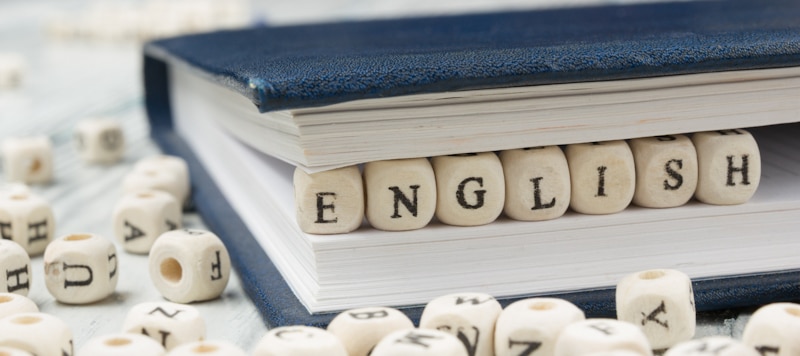It is very important to understand the importance of capitalizing our words. They are helpful signals for the reader to know and understand what the author is referring to. For example, it’s very different to say “I used to live in a white house” vs. “I used to live in The White House.” In this article, you will be introduced to the world of capitalization of the English language, and more specifically, answering the question: When do you capitalize the word English?
When referring to the country of England, the people of England (Englishmen), or the language of English, the word English is a proper noun, and therefore should always be capitalized. This is because proper nouns refer to an individual entity, a specific person, place, or thing, like Mia, Portugal, or Prada.

The basics of capitalization and grammar are as follows:
- Capitalize the first letter of significant words when writing titles, such as “The Devil Wears Prada” or “The Polar Express.”
- Capitalize when writing the names of people, places, or things, like “Molly,” “New York,” or “Netflix.”
- Capitalize the first word of every text and the first word after punctuation.
Examples: “The school did not expect any visitors today. However, they could make an exception.”, “The store closes at 3pm on weekends. We will have to wait for Monday.” and “A thief stole my purse! Help me!”
GUIDELINES FOR CAPITALIZATION.
These rules are pretty simple and commonly known. Still, in the heat of the moment, as you are typing away at your English homework or assignment, things can get quite technical and confusing as the English language is broad and complex. The following acronym MINTS can be an easily reachable tool to learn and practice the technicalities of writing and grammar:
M.I.N.T.S.:
- M is for Months, Days, and Holidays.
Ex: I visited the country of England in November of last year.
Seasons (summer, spring, fall, winter) are not capitalized, as they are considered common nouns, not proper nouns. Remember, proper nouns are always capitalized, whereas common nouns are not.
An exception to this rule would be cases where we always capitalize: Titles, names of people, places, and/or things, and the first word of a sentence.
- I is for the letter I.
Ex: I am a native English speaker.
Have you noticed that “I” is the only pronoun that we capitalize? Even in other languages, pronouns are not capitalized. Only in the English language will you find this.
The most generally accepted explanation for this phenomenon is that the letter “I,” when referring to the self and to the person speaking, could not be left to stand alone, uncapitalized, as a single letter. Also, due to its shy presentation, it is aesthetically preferable for its capitalization. “I” just looks better in writing.
Fun fact: The letter I for most of modern history did not use to be capitalized. The term “I” as a single-letter pronoun came from the Old and Middle Ages when the word for “I” came from the German “ich,” and in writings of the time was commonly spelled as “ic,” not capitalized. As time went on, the spelling and pronunciation of the word changed and lost the C consonant. The new term “i” was left lowercase until the author of “The Canterbury Tales” in the late 1300s utilized the personal pronoun “I” in uppercase. It is said that the author styled the pronoun in this way because it appeared slightly taller than its lowercase equivalent, and it is more comfortable to read, as well as casts a grandiose halo onto the protagonist of the tale.
- N is for Names, referring to proper nouns. As explained before, common nouns are the ones utilized when we are referring to a generic term, like library, police officer, house. A proper noun or proper name is specific to the individual person, place, or thing, like The Library of Santa Fe, Officer James, and The White House.
- T refers to titles. As stated before, the rule of thumb for learning to capitalize titles is to capitalize all significant words in a title. So nouns, pronouns, verbs, and adjectives should always be capitalized in a title. However, due to the artistic nature of the writing, it really is up to the author to determine the correct spelling and grammar of the title.
- S is for the start of sentences. Last but not least, the most commonly known rule of them all: always capitalize the first word of every sentence. This is used to signalize the beginning of a new sentence, and it is always helpful when reading or speaking from the written word. Like punctuation, it does not affect the language itself, but it serves to better understand and recognize the point the author is attempting to make.
Exceptions
Now, for every rule, there is an exception. And that’s no exception to capitalization rules!
So far, the capitalization rules and terms are quite easy and understandable. What do we capitalize? Every first word of every sentence, every name or pronoun, and every major word in titles.
Now, what do we not capitalize? Here are a few examples.
While we capitalize all the pretty significant words in a title, we do not capitalize short prepositions, short conjunctions, or articles: Eg, Harry Potter, and the Sorcerer’s Stone.
While we do capitalize names and other proper pronouns, we do not capitalize occupation titles when they are not used as part of the name. E.g., the young professor, Doctor Mike.
While we capitalize names of places, countries, cities, or regions, we do not capitalize on directions. E.g., North America, heading north.
While we do capitalize Days, Months, and Holidays, we do not capitalize seasons or centuries. E.g., Monday, eighteenth-century.
While we do capitalize words that show family relationships when used with a person’s name, we do not capitalize words that show a family relationship when used after a possessive pronoun. E.g., Uncle Nick, my uncle Nick.

Capitalization in poems and art
Taking into consideration all of these rules and exceptions, when it comes to art and poetry, there are even more exceptions and alternative guidelines to capitalization. It is always a discussion in regards to punctuation in poetry and the arts because we see many instances where the capitalization rules are not followed, but the grammar is still deemed correct.
For example:
From childhood’s hour, I have not been
As others were—I have not seen
As others saw—I could not bring
My passions from a common spring—
Fraction of “Alone”, -Edgar Allan Poe
As we can see in this example, every first word of every phrase is capitalized, even though they are not new sentences being formed. This is because styled this way makes it more aesthetically pleasing to the reader and assists in following the melody of the poem.
In its reverse form, non-capitalization is a new approach that has been popularized in recent times. Many poets find themselves completely against this approach, opting to prefer the more visually appealing all-capitalized approach.
In this style of writing, no words are capitalized in the poem. The exceptions to this style could be when capitalizing proper nouns like names or when personifying an inanimate object or thing. Regardless, the use of capitalization would be 100% up to the author’s discretion.
So, when do you capitalize the word English?
The simple answer is: always!
The reasoning behind it: Whenever we are using the term “English,” it is referring to the language English, the people of England, or the place of England. In all of these instances, as we have learned from this article, we capitalize the word.
Next time you are pondering over if a word should be capitalized or not, remember your M.I.N.T.S.!
Shawn Manaher is the founder and CEO of The Content Authority. He’s one part content manager, one part writing ninja organizer, and two parts leader of top content creators. You don’t even want to know what he calls pancakes.

